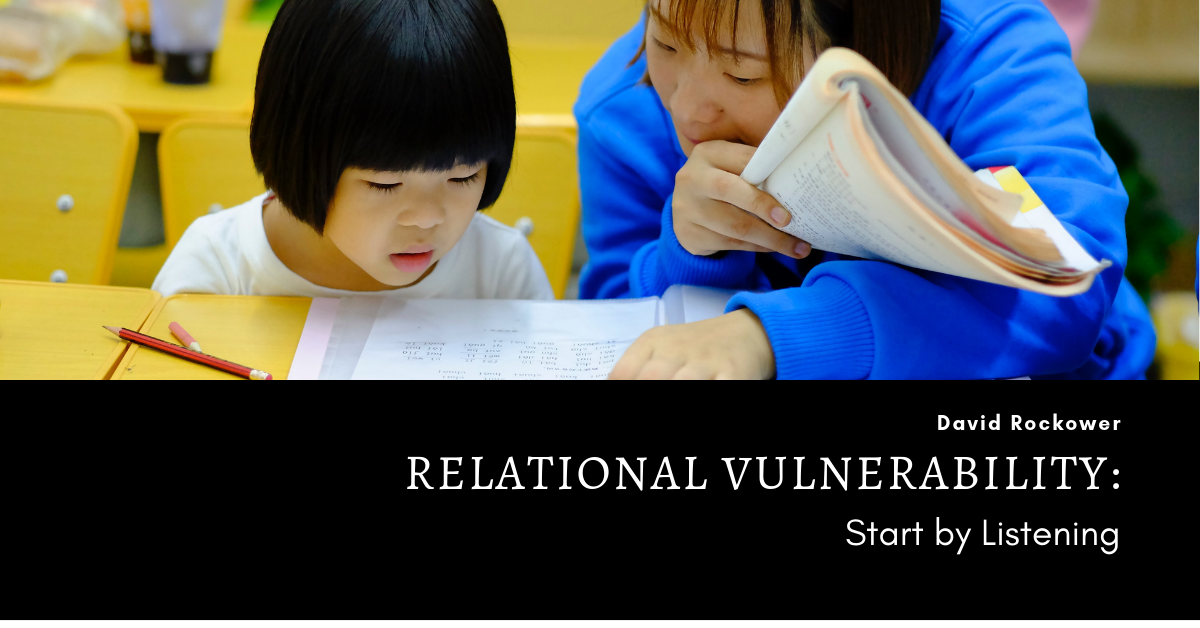 Photo credit: Jerry Wang
Photo credit: Jerry Wang
By David Rockower
It’s a Friday afternoon in early June. I’ve just completed my twenty-first year of teaching, and I’m on my way to have a drink with my eleventh-grade English teacher, who—over the years—has become a running partner and a good friend. As I approach his booth, I see him reading. He’s always early, and he’s always reading. He takes a book to sporting events, and when there’s a break in the action, he reads. When he’s alone in a restaurant, waiting for his former student to arrive, he reads. Earlier in the day, he taught his final lesson. Freshly retired, he is a picture of contentment: his braided, gray hair rests against a black vest. He sports a burgundy fedora, and his reading glasses hang from a rainbow-colored lanyard. He smiles as I approach.
There is no small talk with Michael. He wants to know how my year ended, if I’m overly stressed, if I’ve been a reflective teacher this school year. I want to know what it’s like for him now—for someone who has dedicated his life to the profession to know it’s suddenly over. I want him to be satisfied but sad. That would mean he’s had his bellyful of teaching but he’ll miss what I’ll be continuing to do for the foreseeable future. I’m just about to ask, when he begins:
“I spent the first ten years of my career trying to convince students that I was smart, that I mattered. Eventually, I learned that I should have been making the students understand that they mattered.” He pauses here to make the lesson more personal. “Your teaching is only going to get better, David. You’re at the point in your career where you know that what really matters—more than any curriculum—is the way you look every student in the eye and listen deeply. The kind of exhausting, intense listening that shows them that they have every ounce of your attention. When you give them twenty seconds of focused listening, to the point where you are not aware of yourself, only them, the student will think I matter. This is when the teaching and learning starts.” Michael’s message is what I want to hold on to every day, and it’s the heart of my action research on teacher vulnerability. And, it was inspiring to hear someone with his wisdom affirm my beliefs about the importance of relational vulnerability.
Early in the school year, I explored personal vulnerability, sharing my stories with students, letting them see my worries, shortcomings, and achievements. I found that when I shared essays about my life outside the classroom, it led to more authentic writing from my students; they wrote about gender identity, overcoming anxiety, and the importance of foster care. I also began to pay closer attention to my relational vulnerability—my willingness to apologize to students, to give them sincere and specific compliments, and to listen deeply. I’ve always valued community and connection when teaching, but this year I hoped to gauge my students’ perception of just how important these elements are to teaching and learning.
Near the end of the school year, I asked my students to respond, in writing, to questions about relational vulnerability. Initially, I wanted to frame the questions in first person, so that I could learn what I should be doing more or less of, but for the purposes of my research, I wanted to get more global feedback about teachers in general. Below are the questions with a sampling of student responses.
What have teachers said that helped you as a student/person?
Something that also helps my relationship with teachers is being able to just have a regular conversation with them, and having a teacher to talk to and it doesn't feel weird.
When someone that you respect and look up to as much as your teacher tells you that you've gotten better, you tend to believe them and get hope that you'll keep improving.
Whenever someone points out what I have done well and what I need to improve on, I really try to adapt to what they are saying. There are rarely single moments that really do amazing things, but they never work as well as when there is just a steady flow of help.
When teachers give back positive feedback more than negative feedback, because it just helps to hear when you are doing something good rather than when you are just doing things that are bad.
What have teachers done that helped you as a student/person?
When teachers are understanding of my busy schedule it also helps me. It can be stressful to try to fit everything in sometimes, and when I've been having a particularly eventful week and they understand, it really helps my mental health.
In the past, the thing that teachers have done that have helped me the most is when they have a one on one conversation with me.
For me, whenever a teacher is just there to listen, it really helps. Whether I am ranting about random things or needing help on a project, a listening ear always does good. For me, just knowing that someone is there is really amazing.
What have teachers said that they shouldn’t say again?
I really believe that the worst thing that teachers can say is nothing. It's human nature to want answers, and when you don't get any, you're often left with a feeling of being unfulfilled.
Whenever a teacher just gives straight up criticism of a project, as in saying "This needs a lot of work," without giving any specific things I could improve on, I often find that really hard.
What have teachers done that they shouldn’t do again?
. . . teachers need to have more mercy and forgiveness. I think that teachers just need to give students a chance to say their part sometimes. If they have a problem with something we did, then to come to us.
I really just take general inattentiveness really hard. If a teacher just doesn't pay attention to my project, I take it as them just getting bored by it and not liking it at all. That always crushed my engagement in that project, and I became much less invested in working on it.
I expected more comments about curriculum, instruction, grades, and teaching style. But most of the students’ comments were about relationships, the connection or lack thereof between teacher and student. Our students want to be heard; they need us to recognize them where they are right now, as beautiful, flawed, complex individuals. They need us to be patient when they make mistakes. And most importantly, they are screaming for us to see and hear them.
Relational vulnerability isn’t a once-and-done practice. We need to be deliberate about making time to listen and know our students. In his book, Not Light, But Fire, Matthew Kay discusses the necessity of building relationships:
If all of our nonacademic conversations with students happen in “garbage time,” or not at all, it is understandably healthy of them to maintain thick walls around their vulnerability. It is understandably healthy of them to trust only those who consider them a priority. It is understandably healthy of them to distrust teachers who walk them through hot button racial land mines, but don’t know about their dance recital or new business, or if they won their football game. We may not always be invited to engage in house talk, but our odds increase once we create an environment of humility and genuine interest in one another’s lives and passions (37).
***
Before Michael and I part ways, he leaves me with one more gem: “It really doesn’t matter if you’re talking about a relationship with a friend, a student, or a family member; the purest manifestation of love is when you’re listening so closely, you are only aware of the person in front of you.” I may have to give up part of my lunch period, my prep time, and maybe some time before or after school, but I vow to make time to listen deeply next year. In those moments, I hope I can disappear.
…
Works Cited
Kay, Matthew R. 2018. Not Light, But Fire: How to Lead Meaningful Race Conversations in the Classroom. Portsmouth, NH: Stenhouse Publishers.
 David Rockower (Boalsburg, PA) believes that classrooms should be a second home for students, where they discover and celebrate strengths, where student voice, choice, and engagement are paramount. Currently, he teaches English at the Delta Program, a small, democratic middle school in the State College Area School District. He is also a bi-monthly essayist for State College Magazine and has published articles in The Washington Post and Education Week. In 2017, David was awarded as National Middle School English Teacher of the Year by the National Council of Teachers of English. You can follow him on Twitter @dgrock
David Rockower (Boalsburg, PA) believes that classrooms should be a second home for students, where they discover and celebrate strengths, where student voice, choice, and engagement are paramount. Currently, he teaches English at the Delta Program, a small, democratic middle school in the State College Area School District. He is also a bi-monthly essayist for State College Magazine and has published articles in The Washington Post and Education Week. In 2017, David was awarded as National Middle School English Teacher of the Year by the National Council of Teachers of English. You can follow him on Twitter @dgrock


